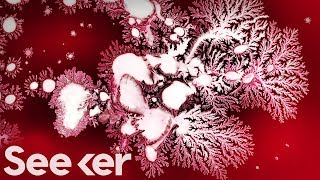Bacteria can get pretty small, with sizes ranging typically from .2 to 10 microns.
细菌可以非常小,一般从0.2到10微米不等。
But can organisms get even smaller?
但生物体是否还能变得更小?
Answering that question isn't just a fun trivia fact, but could help us in our search for extraterrestrial life.
回答这个问题不仅是一件有趣的小事,而且可以帮助我们寻找地外生命。
Viruses can get even smaller than bacteria, with a single virus getting as small as just 20 nanometers, or ten times smaller than even the most bitty bacterium.
病毒体积可以比细菌更小,单一病毒体可以小至20纳米,比最微小的细菌还小10倍。
Technically though we don't really count viruses as being alive.
尽管严格来讲,我们认为病毒并非生命体。
They don't eat or have a metabolism, but even if they did they still can't replicate on their own.
它们不吃东西,也没有新陈代谢,但即便它们如此,它们还是无法实现自我复制。
They need to hijack a host like a bacterium in order to make copies of themselves, so without a host a virus can't multiply.
为了实现复制,它们需要像细菌一样,找到一个宿主,所以没有宿主,病毒就不能繁殖。
To really be alive an organism has to fit all the microscopic machinery that allows it to eat and self-replicate inside itself.
要想真正成为生命体,一个生物体必须适应所有的微观机制,自己进食,并实现自我复制。
And since these machines are on a molecular scale, they're limited by fundamental laws of the universe.
由于这些机制都停留在分子尺度上,它们都要遵循宇宙的基本定律。
They can only get as small as molecules and atoms will let them.
生物体只能达到分子和原子能让它们达到的微小程度。
So with that in mind scientists have calculated that the absolute minimum size a free-living organism can be is theoretically around 200 nanometers in diameter.
因此,考虑到这一点,科学家们认为,理论上,一个自由生命有机体的绝对最小尺寸大约可为直径200纳米。
So far that prediction seems to be holding up, as the smallest living microbes we've found are about that size.
到目前为止,这一预测似乎仍未被打破,因为我们发现的最小活微生物大约就是这么大。
And this lower size limit doesn't just apply to Earth microbes, it's universal for all carbon based life.
这种较小尺寸水平的限制不仅仅适用于地球微生物,它普适于宇宙中所有基于碳的生命物质。
But for some, they're hoping that limit is off.
但对一些人来说,他们希望这种限制能被打破。
In 1996 researchers proposed nanoscopic structures in a Martian meteorite might be the remains of tiny life forms they dubbed nanobacteria.
1996年,研究人员提出火星陨石上的纳米结构可能是(某种)微小生命形式的遗骸,他们称之为纳米细菌。
These supposed nanobacteria fossils were a tenth the size of what we think is possible, too small to fit a single ribosome,
这些所谓的纳米细菌化石是我们认为生命体可能大小的十分之一,太小了,以至于连一个单核糖体都无法容纳,
a structure cells need to make proteins so the claim was met with a lot of skepticism and was never proven.
而单核糖体是一种制造蛋白质所必须的细胞结构,所以这种说法遭到了许多怀疑,而且从未得到证实。
So sorry to dash your hopes about aliens but it looks like 200 nanometers is about as small as life can get.
很抱歉,让你对外星生命的希望破灭了,但是似乎200纳米大约就是你目前所能看到最小的生命体了。
But that doesn't mean we should stop looking. Here help me look.
但这并不意味着我们的搜寻应该就此止步。帮我看看这里。

Even microorganisms have a story to tell. But they can't make a website. You can.
微生物甚至也有故事要讲。但是它们却无法建立网站。但你可以。
When you buy a domain name from Domain.com, you're taking the first steps in creating an identity and vision for your brand.
你从Domain.com购买一个域名时,是你为你的品牌确立身份和提出愿景的第一步。
No domain extension will help tell your story like a .COM or .NET domain name.
像.COM或.NET的域名后缀,最能帮助你讲述你的故事。
Get 20% off Domain.com's already affordable domain names and web hosting when you use coupon code SEEKER at checkout.
输入SEEKER 优惠码,就可以在本就便宜的域名及网站托管服务上打八折。
Worried about super bacteria?
担心超级细菌吗?
Check out this video on how scientists are using their own defenses against them.
看看这段视频,科学家们是如何自设防御手段对付它们的。
The smallest microbe we've found looks packed to the brim with DNA and scientists think it has to be parasitic to survive, so I wouldn't get your hopes up that independent life will be smaller.
我们所发现的最小微生物看上去边缘挤满了DNA,科学家认为它必须寄生才能生存,所以我不想让你对能够独立存活的更小生命体抱有希望。
That's all for now, thanks for watching Seeker!
本期结束,谢谢观看!


